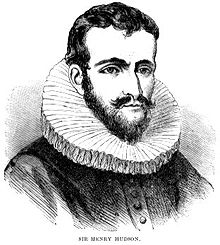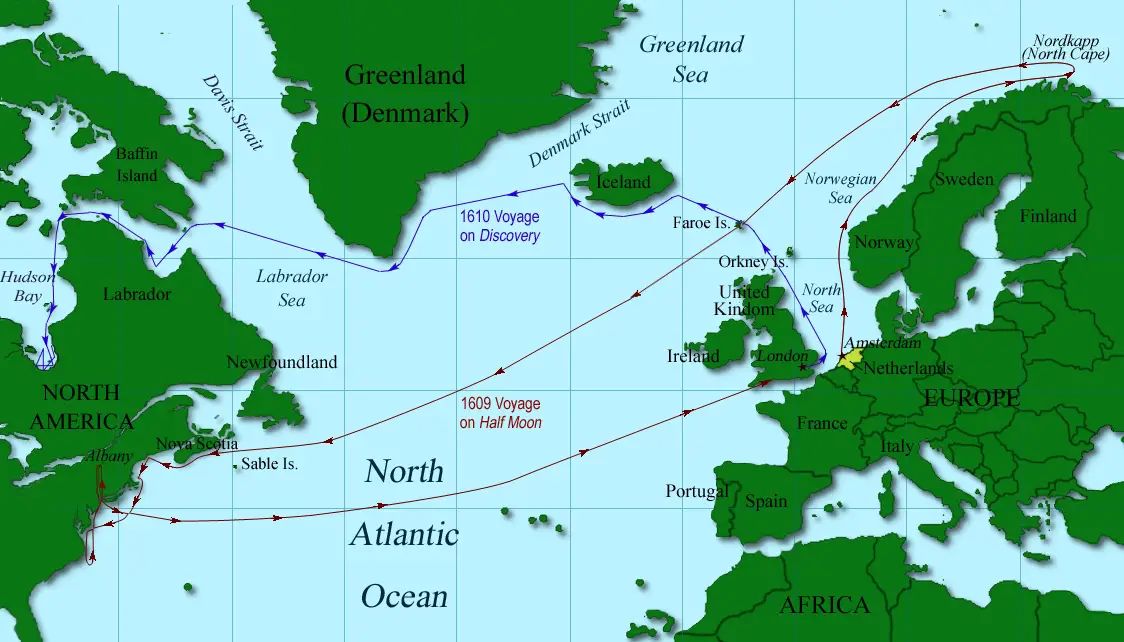Henry Hudson was one of England's most famous explorers, both for his discoveries and for the events that took place during his last known voyage.
The conventional route from Europe to Asia at that time was south, around the horn of Africa, and then east. Even though Christopher Columbus had landed in the New World in 1492, the idea of sailing west to go east was slow to filter through what was in the 16th Century a large brotherhood of seafarers looking to expand on what they already knew rather than risk their lives on something new. Hudson, however, was more of an adventurer than most, and he keenly wanted to make a name for himself by delivering the Northwest Passage to his employers. During a five-year period, he secure financial backing from a few different individuals and companies, all of whom were keen to have their names associated with any new discovery. Hudson didn't start out sailing west across the Atlantic, though. Hudson's first voyage, in 1607, ended up in and around some of the islands off Greenland before turning back because of icy conditions. The following year, he got a bit farther from home, reaching a frigid archipelago north of Russia before having to turn back, again because of ice blocks too large to pass. Hudson's next voyage, for the Dutch East India Company in 1609, set him on a career path from which he never recovered. Again blocked by ice north of Russia, Hudson ordered his ship, the Half Moon, to turn around and head west, toward the New World. Hudson and his crew reached Nova Scotia, sailed down the coastline as far as the Chesapeake Bay, and then explored New York Harbor and sailed up the river that eventually bore his name, as far as what is now Albany. They had some interactions with Native Americans along the way, including one violent episode that ended with the death of a crewmember.
The voyage had set off in April, but several months of sailing and exploring had left the ship in icy waters and low on supplies. Forced to spend the winter away from home, the crew began to resent Hudson and his fancies. The following June, when it was safe to set sail again, Hudson wanted to keep searching for the way east. His crew, however, was more interested in going directly east and back home. Rather than obey Hudson's orders, they followed their own counsel and put Hudson in a lifeboat, with no supplies, on June 23, 1611. Hudson was not alone in this boat; his son and a few crewmembers were there as well. But the rest of the crew set sail for England, and Hudson was never heard from again. Hudson managed to capture the imagination of a few other interested parties, however. Dutch settlers founded New Amsterdam (which later was called New Netherland) at the mouth of the Hudson River in 1625 and put down trading roots at a few other nearby locations. English explorers eventually colonized most of the areas that Hudson explored. His name is still spoken on a daily basis throughout the American Northeast and Canada: Ships still sail up the Hudson River or in and out of the Hudson Bay and the Hudson Strait. People still live in the Hudson River Valley, and in Hudson, N.Y., and Hudson County, N.J. |
|
Social Studies for Kids
copyright 2002–2026
David White

 Not much is known about Hudson's early life. He was born in England in the last half of the 16th Century and must have spent enough time aboard ships when he was young to be able to achieve the rank of captain and commander, which he had in 1607 as the head of his voyage to the New World in search of the fabled Northwest Passage. Some reports say that Hudson was married and had children. Some reports say that he spent time at sea when he was young. At any rate, England's Muscovy Company hired Hudson in 1607 to find a northern route to Asia.
Not much is known about Hudson's early life. He was born in England in the last half of the 16th Century and must have spent enough time aboard ships when he was young to be able to achieve the rank of captain and commander, which he had in 1607 as the head of his voyage to the New World in search of the fabled Northwest Passage. Some reports say that Hudson was married and had children. Some reports say that he spent time at sea when he was young. At any rate, England's Muscovy Company hired Hudson in 1607 to find a northern route to Asia. Hudson's discoveries earned him more financial support, and he headed another voyage westward, on the Discovery, in 1610. Hudson and his crew sailed back into familiar waters and then made their way into what is now the Hudson Strait and the Hudson Bay. Convinced that he was finally sailing into the Northwest Passage, Hudson urged his men on, and the crew sailed into what is now James Bay. There, they found nothing but land.
Hudson's discoveries earned him more financial support, and he headed another voyage westward, on the Discovery, in 1610. Hudson and his crew sailed back into familiar waters and then made their way into what is now the Hudson Strait and the Hudson Bay. Convinced that he was finally sailing into the Northwest Passage, Hudson urged his men on, and the crew sailed into what is now James Bay. There, they found nothing but land.
